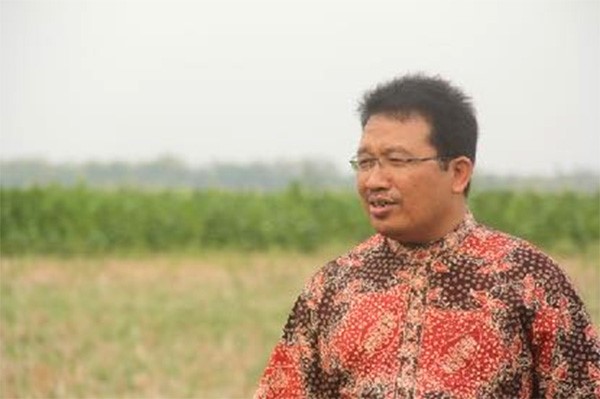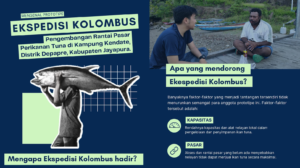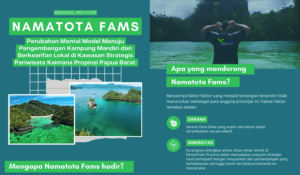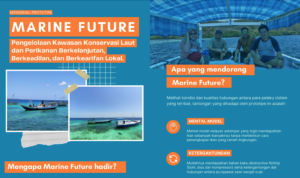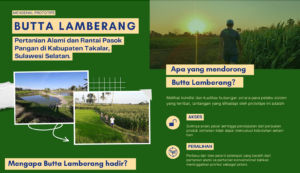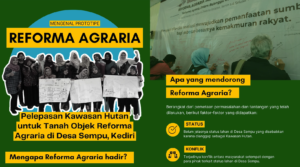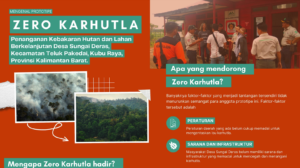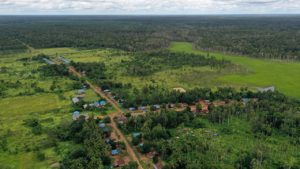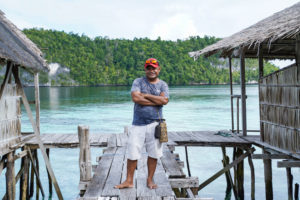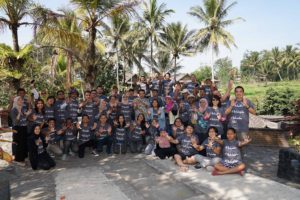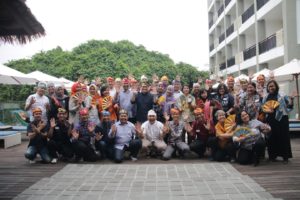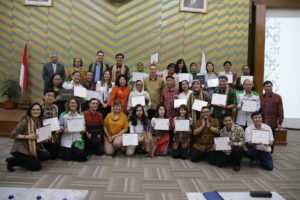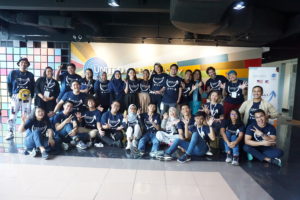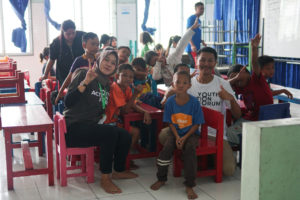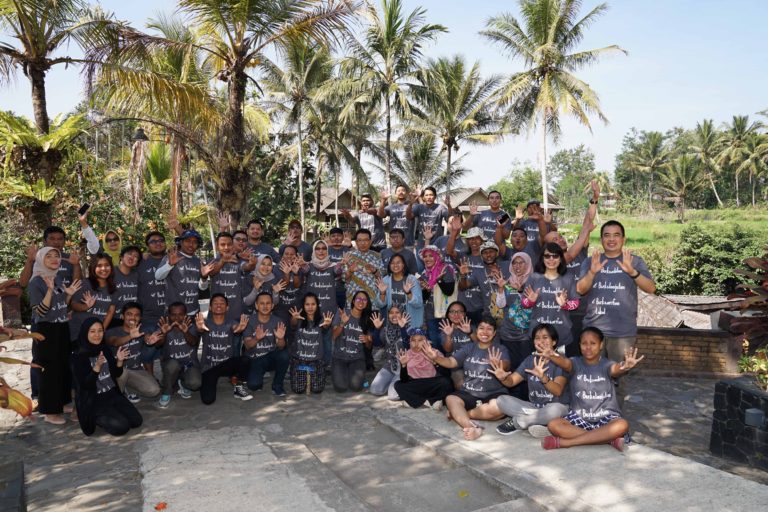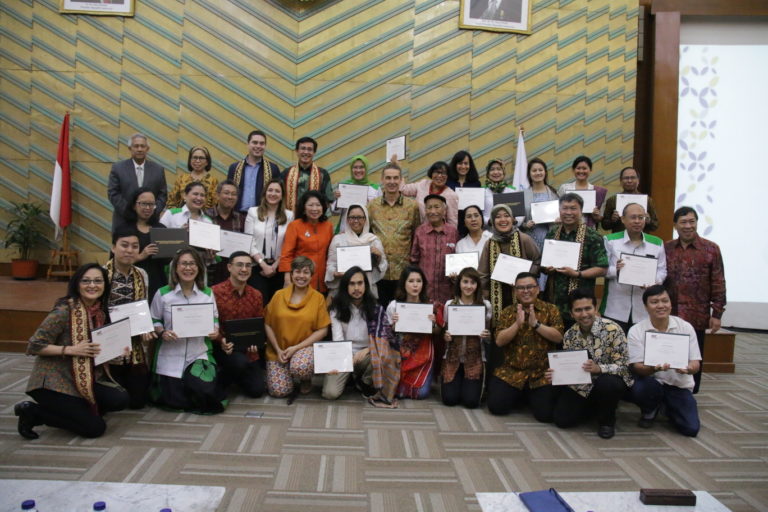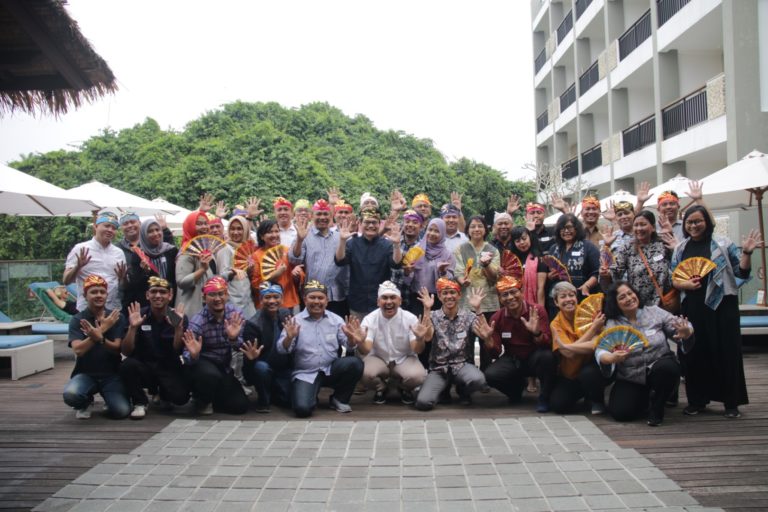In my fellowship program with MIT last year I learned an exercise called shadowing. Its purpose is to understand the background, life, and job of another individual. Shadowing is meant to understand the person by following him or her without passing judgment or making opinions on the subject.
Basically trying to live in their shoes.
My intention to study the Mr Suyoto who is more known as “Kang Yoto” was because I heard of him and was fascinated by what I have heard of him. He is the Bupati (Regent) of Bojonegoro, East Java. He was elected in 2007 for a five-year term and has become a controversial leader by not fitting your regular impression on what an elected official usually is. It intrigued me and made me want to know this person for myself, and not just hearing it from others.
In June of this year I asked his permission to shadow him. He never questioned my motive and said I am welcome to tail him. Like myself, he was an alumni of the MIT fellowship program the previous year before me. Here is my experience and observations during the three days of shadowing him.
The Energizer Bunny
Bojonegoro is 2.5 hours from Surabaya. I landed just after seven in the evening and directly received a text from Kang Yoto’s personal assistant to get ready to follow him. It was 10:30 pm when I arrived in Bojonegoro, and the driver was instructed to wait at a junction in the middle of nowhere after driving forty minutes out of Bojonegoro. It was like waiting for a secret meeting in the dark at 11:30 pm. Suddenly an entourage of five cars sped by and the phone ringed with the instruction “follow us!”
We drove like a car chase for another 30 minutes through a forest with no houses or civilization up and down hills on with sharp turns at high speed. I asked my driver, where are we going? “We are going to see a wayang show.” Wayang is the traditional Indonesian shadow puppet show.
We reached Gondang village where there were an audience of over two hundred people. I followed the group after my subject shook the hands of everyone, and I mean everyone! He shook the hands of the street vendor, security guard, or anyone who was in his path. Those who were not in his path and are behind a fence got a waving of his hand.
I reached the front of the stage and he calls out; where’s Omar? He started to introduce me to everyone there and asked me to sit next to him at the VIP chair. With that, the shadowing begins! From then on, I was always in his meetings and at the metaphoric arms length of Kang Yoto – the Bupati of Bojonegoro.
He told me the three eclectic looking old men next to him were people of “extraordinary magical powers”. He told me he knew them a long way back and have enjoyed a very good relationship with this group of people who supports him. Here I am; a banker from Singapore siting at a VIP sofa next to the local government head and three witch doctors at one in the morning watching a show in a language I didn’t understand!
Kang Yoto opened the show and started singing! This leader communicated to his people through music. Music is his passion and how he expresses his message to his people. I found out later that he has several music videos of songs, which he wrote and sang. People of this Regency know his songs by heart. He has made a theme song for his mission and what he wants to achieve.
I did not yet have a chance to speak with Yoto and yet he called me on stage, this surprise terrified me. He told me to address the crowd and tell them why I was there and explain who and what I do. I told them I was a banker from Singapore and that I was here to learn of him. The next question he asked me kind of struck me: how did you hear of Bojonegoro and me? I heard of this man from an MIT course. I learned of Kang Yoto from a top university in the US, and prior to that I have never heard of Bojonegoro.
At the speech he told the audience of his humble beginnings coming from a poor family and graduate from an Tsanawiyah (Islamic boarding school), became a lecturer, became an elected local member of parliament, and eventually to become the head of the Kabupaten (regency) of Bojonegoro, population 1.4 million with an area three times the size of Singapore.
He used Singapore as an example and had a mastery of facts and numbers of Singapore’s reserves (3 times of the whole of Indonesia?).
The wayang show ended at 3 in the morning and I understood nothing of the show as it was in Javanese. The wayang show was titled “Wahyu Senopati”; depicting a power struggle for the leadership of a kingdom. I learned later that that Kany Yoto is up for re-election next month. enter the political campaign season.
Despite ending the wayang show in at three in the morning, we all attended the morning ceremony for Pancasila day at 7:45 in the hot morning sun.
Sunny morning and fainting people
The Pancasila ceremony was attended by at least 2,500 people standing at attention in the hot scorching sun. Three quarters of the attendees were high school students. By 8:30 am, I counted some 17 students fainting and falling out of the ceremony. It’s really tough to be in that scorching sun with no shade standing at attention for hours. Having grown up in Indonesian education system, I remembered doing this every Monday morning for twelve years.
The observance ceremony ended an hour later and we moved to the Bupati’s residence where he conducted a meeting with his Vice Bupati, Chief of Staff, and Head of Education. The topic was to discuss promotions and movements of staff in the Education system. His Regency has 20 sub districts with 278 school principals, for this position they weeded out from 800 potential candidates. The promotion and movements are to be confirmed later in the evening and the new staff to be appointed tomorrow.
One comment made by the Vice Governor is to ensure that people who spoke up and are “whistle-blowers” are to be preserved and not demoted; he wanted to encourage a culture where people have the courage to speak up about things that are wrong.
The Bupati also encouraged that they be very transparent with the selection process, he wants everyone to know that the system is fair and not influenced by favouritism and feel left out. He wants the decision to be “institutional and not personal”.
The Bupati’s gave an idea of including “community development and engagement” in determining the performance criteria of the school principals. He insisted the school principals to be connected with the community they are serving. Other qualities he wanted from the Principals is; Outgoing (luwes), Steady (mantap), and has initiative.
He also wanted to create an independent team of architects and engineers to look into each school and public facility to fix minor things that make these facilities look their best; improve the look of their gardens or new coats of paint.
They are also scouting for more people in the legal background. They want more people with argumentative skills. He wants his staff to be “mencurigai diri sendiri”, to keep questioning their own policies, decisions and effectiveness.
The next meeting was with Perhutani; the state owned enterprise that manages Indonesia’s forests. Perhutani is an important stakeholder of Bojonegoro as 42% of Bojonegoro are forests.
The initiative is to tackle Bojonegoro’s problem of water management. He wanted to team up with Perhutani to create more water catchments and reservoirs. This involved dealing with legal interpretations, as Perhutani is tasked with preserving the forest area. Kang Yoto’s argument in this matter is more reservoirs create more trees despite loss of some forest area. “The worlds needs more trees to capture carbon, not necessarily more land.” Many of the forests in Bojonegoro are arid as there is lack of water in the area.
Another topic discussed are the issue of the city’s waste management. He wants to partner with Perhutani to develop compost from recycled garbage.
The meeting ended with him attending the appointment of the new Perhutani Administrator of Bojonegoro attended by some 250 people of Perhutani. He gave a tip to the new Perhutani Head that leaders need to be “present” to connect. He echoed the speech of the out going administrator that said “this company we love”, he said that loving your workplace leads you to care about your company and what you do. He also gave a tip; “its better to build a fence of rice bowls than building a fence of walls.”
The Yoda of Bojonegoro
After lunch, I was given a break by the Bupati and he told me to visit his “Learning House” or Rumah Belajar. This is basically a center which he build to showcase what he has done during his past four years as Bupati. It is open to the public to see and is free of charge. His initiative was to get his people to be involved in knowing what his Government has done, and keeping everyone in the loop. It had many posters showing things from the length of roads fixed and built to the improving budget since he took over.
As I was leaving, a 72 year old man called me inside to share a Bintang Zero – it’s a local non-alcoholic beer. He asked me to chat and this man was enthusiastically full of things to say. He is M’bah Har; Mbak means grandfather in Javanese. Bojonegoro needs more SDM and not SDI; SDM is the Indonesian acronym “Sumber Daya Manusia” which means human resources – SDI in his version means “Sumber Daya Ijazah”, which literally means diploma resources. He thinks that there are many people with Diplomas here, but few people who can be useful resources.
M’bah Har also has comments about the foreign and local oil companies that are coming to Bojonegoro; he thinks that the people here “needs to be assisted to grow and not be put to sleep”. This comment is in line with his opinion that these oil companies just want to take the oil without really helping the local community to become better. He is echoing what the Bupati is saying; the people of Bojonegoro should develop skills to become the mining engineers and not just become the security guards and flagmen of the oil fields. “We value these companies coming here with smart people, but we want these smart people to help make us smarter too.” According to him the wealth of Bojonegoro is not in its oil, but in its people.
He also made an interesting comment about religion here; “there are many Muslims here, but not much of Islam.” He also gave me a tip on being a better parent; to do a weekly review with my children, and ask my son every week on how I have done as a father? This is also practiced in the Bojonegoro government where Kang Yoto opens a forum every Friday at 1 pm where anyone can take the microphone and give him direct feedback every week.
I did not plan this meeting with this man, but it has been one of the most interesting random conversations I had with someone. He also gave me an insight on the people of Bojonegoro.
The Celebrity and his two Shadows
I was instructed to go to the Bupati residence at 6:30 pm that evening. While in the waiting room I found a 28 year old American by the name of Christopher. He just came back from Singapore and will be joining the Bupati and me tonight. To my pleasant surprise, I find out that he is also doing something similar to me; studying the policies of Bojonegoro and its leadership. He has been here for one month and has another five to go. Like me, he is the other shadow of the Bupati.
We took a car ride to a village some forty minutes away. As the car stops, there was a small road filled with vendors of food, local snacks, and all sorts of things you would find in a festival. At the end of this road was the house of
the Kepala Desa (Village Chief) with a stage in front. This village was about to host a party commemorating the birthday of Bojonegoro.
As we walked out the car, I told Chris, so this is how it feels to be on a campaign trail. Shaking hands with everyone and smiling all the way down the road. We both only see this on TV, but now, we are living it. We are part of this entourage. As usual, Kang Yoto took forever to the end of the road as he shook every hand that was in his way.
The village chief invited us to his home and we had some Javanese beef soup dish called rawon. It’s a thick black soup resembling motor oil with cut pieces of beef floating in it. Fortunately, this happened to be one of my favourite food. At this point I am impressed by my fellow shadow; who is a native of Seattle eating anything that was served to him. I admire this white man’s “open will” to eat anything!
We hop to another location 30 minutes away at Gajah village in the area called Baureno. Now this was something else! There is a large stage in the middle of this large field and with at least 3,000 people in attendance. It was a Pengajian Massal dan Pesta Budaya, Mass Qur’an reading and Culture Festival. The final attraction was a show by a famous local comedian Mbah Kirun.
Kang Yoto gave the opening speech and I noticed another side of him. Although I do not understand Javanese, I could catch that he was speaking much slower and in a dialect that mirrored his audience. He is speaking in their level of understanding; he ceases to speak like a head of government and starts in a tone that resembled an elementary school teacher. Speaking half way, and letting the audience fill the rest of the sentence. There is no doubt that Kang Yoto is a gifted speaker, and this change in gear is really impressive.
And once again, he called me to the stage. This time it was in front of 3,000 people! He asked me to explain to everyone why I was there, and how I heard of Bojonegoro. I had to explain myself to his people. Then he asked me a question that my own wife of fifteen years never asked me; “Omar, what is your salary?” I could hear the whole audience went silent.
I actually told the 3,000 people of Gajah village who were mostly farmers the truth. I understood shortly after why Kang Yoto asked this. He wanted to illustrate the importance of education. He wanted to tell them that Indonesians can be competitive abroad and they too have a chance to be as good as they want to be and can dream as high as they want. And the key to that was a good education. He re-iterated that the Bojonegoro people could be more than security guards and flagmen in the oil fields of their back yard.
The whole event ended at 1 am. We proceeded to a small restaurant. By this time I can see why some of my relatives who live in East Java are having serious health problems. The diet there is full of meat parts that are loaded with cholesterol and very unhealthy substances. This is a constant observation I have seen in almost every meal; Although a salad called pecel is very famous there, the side dishes there always include intestines, lungs, tripe, you name it, its there. As the meal ends, it is my second day coming back to my hotel room at three in the morning.
The next morning at ten, was the appointment ceremony of the School principals and other officials that was discussed the day before. There were around 150 people and all of them were asked to sign a “Kontrak Prestasi” (Performance Contract), it is their promise to give their best and be honest in what they do, a promise to be accountable.
The Bupati gave the appointment speech. This time, the tone was very serious and very institutional. “Take the roles that have been given to you with a full heart, don’t stress about as it will just add another burden to your life. Think of your life as a novel or a movie, this is another chapter and fill it with good things and leave a mark that you will be proud to look back on. Make the best of it. Always have a bigger dream in life. Put your heart in bigger dreams, this path of bigger dreams will make you think about bigger things like your community and nation.”
As the ceremony ended I finally went to see his official office. He called in his Camats (District heads). We had an informal chat, and their general message is that it took a while to follow their boss to be open and transparent with their community. It wasn’t easy, but this openness was what enabled them to facilitate change.
The meeting was followed by a visit from the Police head of Bojonegoro who wanted to introduce their newly promoted officers who would get their new postings to head police districts in other regions.
On this occasion their senior officer explained the late Police General Kunarto who is a native of Bojonegoro. Apparently, he was initially slow in his police career and was mocked by his junior classmates on his slow progress. He eventually became the Head of the Indonesian Police, and the boss of the very people who mocked him. General Kunarto had a big heart; he went to one of these people and hugged them passionately and told the person that their mocking was the very reason he managed to be better person and push harder.
Kang Yoto gave the advice to develop special relationships with the local Government. He illustrated how the Bupati became the spokesperson for the police and how the Police District Head became the spokesperson for him. He also mentioned about placement of self in developing relationships. Sometimes you have to manage upwards, downwards and sideways. In all of these positions, you have to always align your heart with it.
For example is his issue of oil in Bojonegoro. The Cepu area, which is part of Bojonegoro, holds 20% of Indonesia’s oil reserves. It is a unique situation where the oil is located in a densely populated area. The trauma of the Lapindo mudflows that is a three-hour drive from Bojonegoro is fresh in people’s minds. His people think that the oil is Bojonegoro’s asset, but oil is shared nationally. On a national level they need someone to blame for holding back the government’s oil production target, Kang Yoto used to respond to every criticism, but later on he realized that thy just needed someone to blame, just for the sake of blaming and not to necessarily help find a solution. So he stopped responding to them. He told the promoted officers that the business of leadership is only to influence people and make decisions. In the case of the oil field, his job is to influence the Central
Government to understand what is best for his people, and not to blindly respond to criticisms they throw at him.
The most senior police officer mentioned that the best time of his career was when he was Kapolres (district head similar to what Bojonegoro has). The reason was it was small enough of a region that allowed him to still be connected with the community and can still create solutions and breakthroughs that are still personal. I wander if this also applies to the Bupati himself, as he moves up to a larger scope, what can be done to be able to maintain this personal contact with his people.
Mass Weeping
We rushed off to attend a Character Building training in the Baureno are fourty minutes away. We stopped by a random place to have Pecel, a local vegetable dish with rice and peanut sauce. When we wanted to pay, the vendor refused – he does not know them and has never been to their shop, but they know him and felt honoured to serve us their food. Apparently this happens a lot in Bojonegoro, the many genuinely support him and just simply would not let him pay.
As we reach the training site, there were about 150 people. The participants were all women and they are the lowest rank of teachers in the education system. They were teachers that have not been hired as full time government employees. Kang Yoto is there to give the closing session of the training.
This session was an interesting insight of how this leader inspires his team of people. He asked them a question of “is it a matter of the heart or is it a matter of the mind?” He asked them to differentiate the two. For example; “why did you eat lunch? Versus what you want to eat for lunch?” One is a matter of the mind and the other is of the heart. He kept on asking questions to provoke them to think of is it heart or mind. This lead him to the next point of why they are teaching in the first place; because matters of the heart is about giving. Love is about giving and it eventually evolves to expecting. He recommends the to keep giving as it gives them a lighter heart and a happier life.
One part of the session is where he asked the participants to put their hand on their heart and close their eyes to feel their heart. On this occasion he explains the meaning of the Quran’s most important verse; the Al-Fatihah. HE explains that this verse is a journey about opening your mind, your heart and eventually your will. It is about letting go. This went on for some 15 minutes and most of the 150 teachers were so emotionally moved and ended up in tears. It was as if they just let go of a heavy load that they were carrying all this time.
It just happens that this training site is close to Kang Yoto’s childhood home. It is a very quiet village in the middle of the tobacco field. Bojonegoro’s main crop is tobacco, it is everywhere! We meet his sisters and brother in-laws. Despite their brother’s top position in the area, they appear to remain themselves. Their whole living room is still filled with recently harvested tobacco leaves, they still have a firewood stove, the kitchen still has no floor, and they still keep chickens in the back of the house. The family remained the same as their surrounding neighbours and have not changed.
Kang Yoto took me and Chris to walk his childhood through the tobacco plantation. I started to notice that this place is where he is happiest, there is no rush and he takes time to enjoy every bite on the tempe goreng that her sister is making. This place is what gives him peace and at the same time what gives him the desire to do what he does as a leader. The MIT Sloan professor Dr Otto Schamer has also visited his home last year and concluded that his source of strength come from this very home, his past and his family were that source. Unlike me, Dr Schamer was fortunate to meet Kang Yoto’s mother who he said is the most important figure in Kang Yoto’s life, she passed away earlier this year.
Later that evening we headed to Kekahan or baby shower for one of his supporters. The kekahan was an all male attendance, there were about eighty people in attendance and all of them were men in the local religious outfits. Started with a reading of a Qur’an verse and followed by a sermon by Kang Yoto. As usual he took the opportunity to explain to the audience who Chris and I was and explained to them why we were here.
Kang Yoto at this event spoke in the role of a preacher. He quoted things form the Qur’an and he told the story of Egyptian Pharaohs, explaining that not all of the Pharaohs were bad. In fact one appointed a political prisoner who was not part of his clan and religion as his Finance Minister because he was the right man for the job. The message was, we should look beyond religion and ethnic background to build the best government. He quoted Mao Zedong who said it didn’t matter what color the cat was as long as he can catch mice.
At his point, I am impressed at the fact that on every occasion, Kang Yoto seems to have new material to speak about. Always having a new angle to discuss and not always staying with the same material when making his speeches the past two days at numerous events. What makes it amazing is how he finds the time to keep maintaining his skills and sharpening his knowledge despite his busy schedule.
As the night ends, he became a host and no longer a Bupati. He knew that Chris and I are yearning for the noodles (Mie Rebus) we had the other day. So we went looking for this roadside vendor to have dinner despite the fact that we already had dinner at the baby shower event. We made a short detour to visit one of Kang Yoto’s volunteers; a local businessman who lives behind the grocery store he owns. I never got the name of the gentlemen, but he had a house with very high ceilings and pictures of Mecca decorating his living room. The gentleman and his wife kept insisting us to keep eating the cookies on the table. It is an Indonesian custom to keep feeding guests of your home. I asked them why they supported Kang Yoto, they said that he genuinely cared for the people and was a rare leader who was not self serving.
The Best Ideas contest
Today would be my last day in Bojonegoro. Chris and I discussed about what we have experienced and what lies ahead for Bojonegoro. This morning would be my last shadowing experience. It would be to attend a session where the Bupati will give advices to the twelve winners of the paper on How to Develop Bojonegoro. This program was initiated several months back by Kang Yoto to gather ideas and suggestions from his own people on how to build their hometown. While in the waiting room, I was introduced to an 87 year old gentlemen who rode his bike some 30 kilometers just to see where Kang Yoto lives. He was a short man with a lot of spirit.
The twelve were people from various backgrounds, some young and some old, and an equal proportion of men and women. It included a journalist, a retired civil servant, a doctor, high school teacher, and university student. The prize for winning this competition was a trip to Singapore and Malaysia. To visit the countries and study what they have achieved. Kang Yoto asked me to give a description of home; Singapore.
I told them that Singapore was a very competitive place and was a people that keep pushing harder to become better. I told them that Singapore is never content and has a relentless obsession to keep changing and improving things. I told them that Liew Kwan Yew viewed Singapore as an 80 story building built on unstable marshland. They had have extraordinary people and will to survive in the competitive global environment. This meant developing and attracting the best people to keep them ahead.
Kang Yoto shared his views with the winners on how he wants to develop Bojonegoro. The priorities he will focus on is water management; Bojonegoro experiences floods and droughts. Building dams and water reservoirs will be a crucial agenda for Bojonegoro.
He also wants to put focus on developing people. He illustrated that he wanted to build healthcare, not hospitals. Building hospitals is easy, the hard part is building the skilled medical professionals. He had a very ambitions vision to develop people of Bojonegoro to become good doctors and specialists by helping them to fund the best education they can get (overseas if needed) and committing them to stay and practice in Bojonegoro. Just like these winners, he wanted Bojonegoro to invest in their people and develop their talent with an ambitious goal of patients considering heart surgery in Bojonegoro instead of Singapore. This may appear to be an ambitious goal, but his daringness to have a vision to dream big is the sure way to improve his people.
I ducked out of the meeting early to catch my flight in Surabaya and leave very exhausted but immensely optimistic about my country after seeing and experiencing an inspirational leader like Kang Yoto. Many complain about this country’s shortcomings, but few people realize that this is changing. People with their heart in the right place like Kang Yoto are coming out and making bold transformations.
For me personally, this shadowing trip has inspired me more to give a damn and not just watch and think that this is somebody else’s job. I sincerely hope that Kang Yoto will have his second term in next month’s election – the people of Bojonegoro are lucky to have a leader like him.
by Omar Agoes
2-3 October 2012


